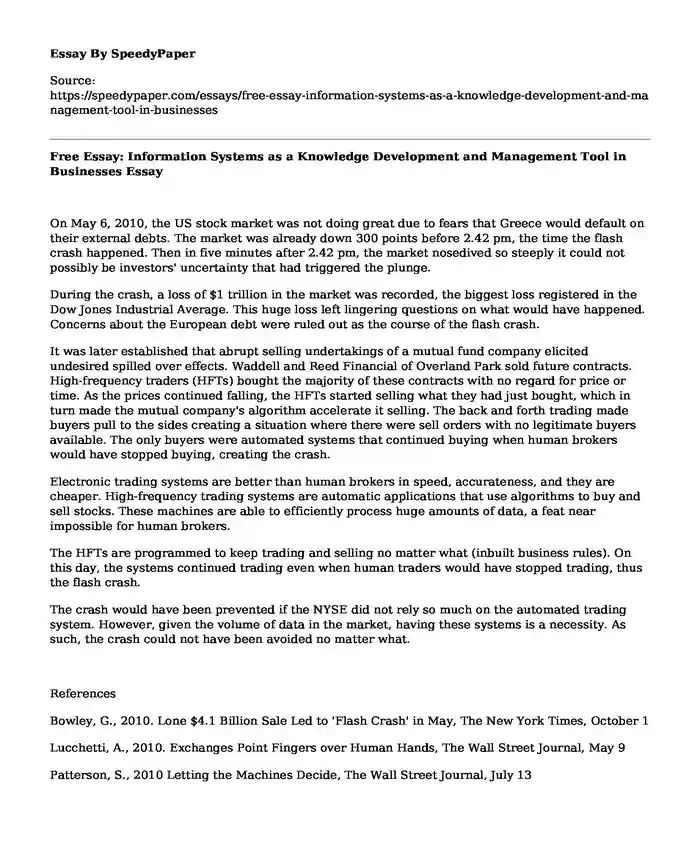
| Type of paper: | Critical thinking |
| Categories: | Management Knowledge Business |
| Pages: | 2 |
| Wordcount: | 466 words |
On May 6, 2010, the US stock market was not doing great due to fears that Greece would default on their external debts. The market was already down 300 points before 2.42 pm, the time the flash crash happened. Then in five minutes after 2.42 pm, the market nosedived so steeply it could not possibly be investors' uncertainty that had triggered the plunge.
During the crash, a loss of $1 trillion in the market was recorded, the biggest loss registered in the Dow Jones Industrial Average. This huge loss left lingering questions on what would have happened. Concerns about the European debt were ruled out as the course of the flash crash.
It was later established that abrupt selling undertakings of a mutual fund company elicited undesired spilled over effects. Waddell and Reed Financial of Overland Park sold future contracts. High-frequency traders (HFTs) bought the majority of these contracts with no regard for price or time. As the prices continued falling, the HFTs started selling what they had just bought, which in turn made the mutual company's algorithm accelerate it selling. The back and forth trading made buyers pull to the sides creating a situation where there were sell orders with no legitimate buyers available. The only buyers were automated systems that continued buying when human brokers would have stopped buying, creating the crash.
Electronic trading systems are better than human brokers in speed, accurateness, and they are cheaper. High-frequency trading systems are automatic applications that use algorithms to buy and sell stocks. These machines are able to efficiently process huge amounts of data, a feat near impossible for human brokers.
The HFTs are programmed to keep trading and selling no matter what (inbuilt business rules). On this day, the systems continued trading even when human traders would have stopped trading, thus the flash crash.
The crash would have been prevented if the NYSE did not rely so much on the automated trading system. However, given the volume of data in the market, having these systems is a necessity. As such, the crash could not have been avoided no matter what.
References
Bowley, G., 2010. Lone $4.1 Billion Sale Led to 'Flash Crash' in May, The New York Times, October 1
Lucchetti, A., 2010. Exchanges Point Fingers over Human Hands, The Wall Street Journal, May 9
Patterson, S., 2010 Letting the Machines Decide, The Wall Street Journal, July 13
Patterson S. and Lauricella T., 2010 Did a Big Bet Help Trigger 'Black Swan' Stock Swoon? The Wall Street Journal, May 10
Wyatt, E., 2010. Regulators Vow to Find Way to Stop Rapid Dives, The New York Times, May 10
Scannel, K. and Johnson, F., 2010. Schapiro: Web of Rules Aided Fall, The Wall Street Journal, May 12
Harris, L., 2010. How to Prevent another Trading Panic, The Wall Street Journal, May 12Patterson S., 2010. How the 'Flash Crash' Echoed Black Monday, The Wall Street Journal, May 17
Cite this page
Free Essay: Information Systems as a Knowledge Development and Management Tool in Businesses. (2022, Mar 09). Retrieved from https://speedypaper.net/essays/free-essay-information-systems-as-a-knowledge-development-and-management-tool-in-businesses
Request Removal
If you are the original author of this essay and no longer wish to have it published on the SpeedyPaper website, please click below to request its removal:
- Essay Example on My Preferred Learning Styles
- Essay Sample: Affidavit for Search Warrant
- Essay Sample about Microsoft Branding Strategy
- Essay Sample: Foreign Policy Throughout American History
- ISI Supporting Taliban - Free Essay Example
- Essay Sample: Exploring the Impact of Technology on Society and the Economy
- Free Essay Sample - Apgar Scoring
Popular categories




